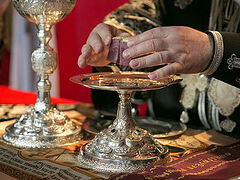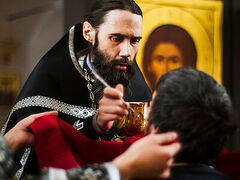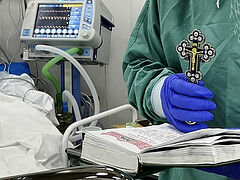In the writings of men, we read many declarations about cures for various diseases. But to this day, no one who knows the art of medicine has dared to make such a pronouncement that would promise immortality to mortals, resurrection to the dead; although such an announcement would have no trouble finding people ready to believe it, because faith in the possibility of the existence of such an all-powerful remedy against illness and death has existed from of old, and is sometimes expressed in folk legends.
Although these legends sometimes had a fairy-tale character, nevertheless, there would hardly be foundation to say they are only the fruit of someone’s dreamy imagination, and not an echo from antiquity. Did not these tales have their origin, for example, in the pronouncements of those ancient visionaries to whom the mysteries of God were revealed? Or maybe their origin is even more ancient—from that primordial human couple who were gifted with immortality but lost it through sin?
Either way, faith in the possibility of the existence of a life-giving remedy didn’t remain only a legend, but later became a wonderful reality. This mystery of life and immortality is revealed: It is in the Church, and through the Church that it became known to the bulk of mankind. We Christians are shown the healing that destroys the root of every illness; to us, beloved, is indicated the path to immortality. We all know, we’ve all heard such an announcement. We read the good news about this in the Holy Gospel; this mighty, Divine healing is proclaimed in the Church. This is the life-giving Body and life-giving Blood of our Lord Jesus Christ. The faithful know that they are given that those who receive them might have eternal life.
“We know this,” some might say, “but we don’t see that this holy healing has stopped diseases and destroyed death. On the contrary, we know that those who commune of this most sacred Mystery get sick and believers die just like unbelievers. Where is the freedom from sickness? Where the immortality?”
It’s true that those who commune of the Holy Mysteries of Christ aren’t free from sickness and that Christians die like other people. But for those who worthily receive the Bread of Life and the Cup of Immortality, this sickness and death aren’t the sickness and death of the pagan or the unbeliever, who voluntarily withdraws from Holy Communion because of his unbelief or the carelessness of a pagan. The punishment for sin is the consequence of sin.
What is the death of a pagan? A transition from temporal to eternal sufferings, from temporal to eternal death. The sickness and death of a Christian who is in communion with Christ as the Source of life and immortality has a completely different meaning. Let’s explain this. There are two kinds of sickness and two kinds of death. There is sickness of the body and there is sickness of the soul; there is bodily death and spiritual death. Bodily sickness and death occurred as the result of spiritual sickness and death. Having tasted of the forbidden fruit, Adam first suffered spiritual sickness, and then bodily; first came spiritual death, and then bodily.
The sickness of the soul is sin; for the wages of sin is death (Rom. 6:23). To free a man from sickness and death, sin must first be destroyed, as the root cause of sickness and death. Desiring to save man, the Lord offered Himself as a sacrifice for sin: He killed sin through His Body, giving it up to suffer for sin. Then the Lord gave His Body, which died because of (human) sin and resurrected by Divine power, to the faithful, that through it sin, the root of death, might first be killed in man, and then his body might be healed and revived.
The Lord died and rose again. And he that eateth of this bread shall live for ever (Jn. 6:58). First he comes to life in the spirit, having been cleansed from sin, and then in body, which will rise incorruptible. Just as earthly doctors can’t immediately drive sickness out of the body, so spiritual treatment doesn’t immediately destroy sin, but rather gradually. We see an example of this in the saints: With the help of the grace of Christ (Baptism and Communion), they received the desire and strength to wage battle with the passions and to gradually destroy them within themselves. As their passions weakened, their spirit strengthened.
By the strength of their spirit, their bodies were also strengthened, such that they sometimes lived for a very long time in the flesh, exhausted though it was by spiritual exploits. Their bodies received healing power even in this life: One touch of their hand to the sick freed them of their disease. If the saints died, it was in order to rise again with Christ. As Christ rose again after death, and having coming forth from the tomb left the sign of His Resurrection—the burial cloth, so the saints leave a sign of their co-resurrection with Christ—their remains, glorified for some by complete incorruption, and for others with the gift of miracles. The Body and Blood of Christ serves as the source of life for them.
Thus, although those who commune of the Body and Blood of Christ are subject to sickness and death, it’s for their good: By their sicknesses they are cleansed from sins, for he that hath suffered in the flesh hath ceased from sin (1 Pt. 4:1); and death is a transition to a better life. They die in the hope of receiving a much better body, of which they are temporarily divested: Instead of the corruptible they will receive the incorruptible; instead of the unseemly—the glorious; instead of the natural—the spiritual (cf. 1 Cor. 15:44). That’s not even to mention the numerous examples of miraculous healings form serious and fatal diseases that followed immediately after the sick were communed with the Holy Mysteries of Christ.
If in Holy Communion we are given a remedy against the very root of diseases, if moreover it is the Bread that gives life to the world (cf. Jn. 6:33), then shouldn’t everyone who bears the sinful germ of disease within himself, who wants to receive that endless life that is forever free from sickness, sorrows, and sighing and where there is no death, resort to this remedy? Knowing about such an all-powerful remedy, shouldn’t people give up all their possessions, all their treasures, if it were necessary to acquire it? Since this Bread of Life and Source of Immortality are given in the Church, then shouldn’t every church be filled day and night with people coming to receive this life-giving fruit from the tree—Christ, in order to acquire immortality through it? Shouldn’t it be expected that due to the multitude of those coming to church, some people would have to wait in line entire days, months, and even years to receive this salvific remedy from sickness and death, as happened at the Pool of Siloam with the thirty-eight-year-old paralytic (Jn. 5:2-9)?
In a word, shouldn’t everyone cherish this Bread of Life, given to men in place of the paradisiacal Tree of Life?
But what do we see? This most precious remedy, that destroys the root of sickness, is given to everyone, requiring neither gold nor silver, but alas! How few there are who desire to receive it even for free! Incredible foolishness! This pledge of immortality is served every day, in every church, and yet how rarely people come here to receive it, and how many there are who don’t even come to receive it not for a year, not two, but decades. Ruinous carelessness!
The Body of Christ, as the Bread of Life, His Blood, as the Fount of Immortality, could also serve as a cure for the moral maladies that our public life so suffers from, an all-powerful means of reducing the crimes that have so multiplied now, which neither state rulers nor public figures have the means of fighting against. However, these powerful means are neglected. And if they’re sometimes received by some, they remain inactive for them, because those who receive are lacking that living faith and reverent feeling that would make communicants of the Body and Blood of Christ worthy of Heavenly grace.
The Lord took our infirmities upon Himself and bore our sicknesses, and with His stripes we are healed (Is. 53:5). Meanwhile, we have so many infirm people, and enough of them are dying (cf. 1 Cor. 11:30)! Is this not because we either willingly refrain from the holy healing, or because we approach unworthily?
Brethren! Let us approach our Redeemer more often, that His Body, wounded for us, might heal our spiritual wounds and bodily infirmities. Let us fall with faith before His wounds, from which flow His Blood, for He gave us this Blood to drink (cf. Jn. 6:55). Let us reverently eat of it that we might be healed.




